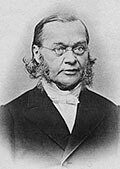the Fifth Week after Epiphany
Click here to learn more!
Bible Commentaries
Hengstenberg on John, Revelation, Ecclesiastes, Ezekiel & Psalms Hengstenberg's Commentary
Old Testament
A collection of songs and prayers expressing worship, lament, thanksgiving, and praise to God. Ecclesiastes
Reflects on the meaning of life, exploring the futility of human endeavors and the pursuit of wisdom. Ezekiel
Visions and prophecies of Jerusalem's fall, Israel's restoration, and a future temple.
New Testament
Theological reflections on Jesus as the Word of God, focusing on his divine nature and mission. Revelation
Apocalyptic visions of God's ultimate victory, Christ's return, and the new heaven and earth.
Author's Biography
Ernst Wilhelm Hengstenberg (1802-1869) was a towering figure in the field of theology, whose influence spanned across the realms of biblical exegesis, prophecy, and the defense of orthodox Protestant beliefs. Born in Fröndenberg, a small town in Prussia (now Germany), Hengstenberg's early education was steeped in classical languages and literature, setting a solid foundation for his later theological studies.
Hengstenberg pursued his education at the University of Bonn, where he was initially attracted to the ideals of German Idealism and the Tübingen School. However, his intellectual journey took a decisive turn towards conservative theology, marking the beginning of his lifelong commitment to defending traditional Protestant doctrines against the rising tide of rationalism and skepticism of his time.
In 1829, Hengstenberg was appointed as a professor at the University of Berlin, a position he held until his death. His tenure at Berlin was characterized by prolific writings and an unwavering stand on the authority of the Scriptures. He founded and edited the "Evangelische Kirchenzeitung," a journal that became a pivotal platform for conservative theology, earning him both accolades and opposition from various quarters.
Hengstenberg's most significant contributions lie in his exhaustive commentaries on the Old Testament, including works on the Psalms, the Book of Revelation, and the prophets. His approach was not merely academic; it was marked by a deep-seated belief in the infallibility of the Bible and the importance of Christian piety. Through his writings, Hengstenberg sought to affirm the historical accuracy of biblical prophecy and the relevance of the Old Testament to Christian faith.
Despite the controversies that surrounded him, Ernst Wilhelm Hengstenberg's legacy endures in the field of biblical scholarship. His work stands as a testament to the enduring power of faith and scholarship in the face of changing intellectual currents. Hengstenberg remains a seminal figure for those who champion the conservative interpretation of Scripture and the unshakeable truths of Christian doctrine.
